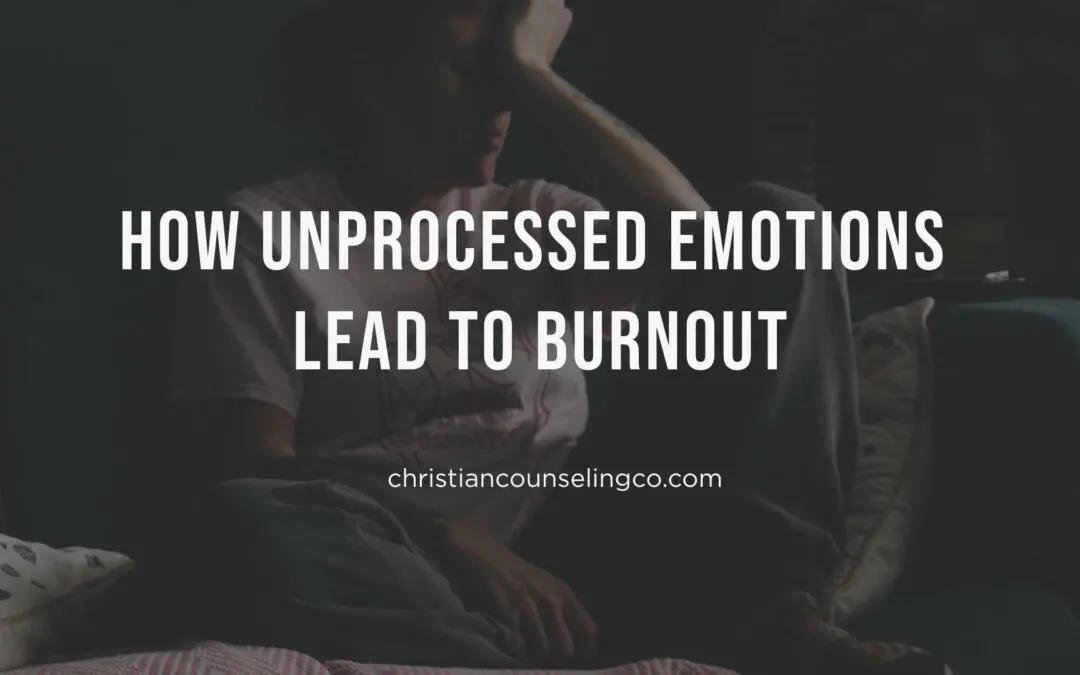Burnout, in general, can be overwhelming to work through. After all, we are not human doings. First and foremost, we are human beings. Yet being with ourselves can often be a scary prospect. Often, when we pause, our bodily signals mix with our racing thoughts and it just feels like “too much.” So, we keep missing the signals our bodies send and then find ourselves at the end of our wicks – burnt out.
How Unprocessed Emotions Lead to Burnout
In Burnout: The Secret to Unlocking the Stress Cycle, Emily and Ameilia Nagoski focus on the emotional exhaustion component of burnout, as this is most strongly linked to “negative impacts on our health, relationships, and work.” Emotions are meant to be noticed, experienced, and moved through.
If you’ve ever been walking your dog when something startles them, you’ve likely seen the dog physically shake off the stress once the threat has been removed. We as humans, instead of letting ourselves feel and respond to our emotions (completing our emotional cycles), can get “stuck” in them.
If we are working hard to avoid or diminish certain emotional experiences of our own, we will inevitably lack empathy, care, and compassion for others’ emotional experiences. When I am trying hard not to experience the sadness I feel, I am going to (probably unknowingly) diminish my partner’s experience of sadness and therefore disconnect relationally.
How to know if you have unprocessed emotions
In Burnout: The Secret to Unlocking the Stress Cycle, Emily and Ameilia Nagoski focus on the emotional exhaustion component of burnout, as this is most strongly linked to “negative impacts on our health, relationships, and work.” Emotions are meant to be noticed, experienced, and moved through.
If you’ve ever been walking your dog when something startles them, you’ve likely seen the dog physically shake off the stress once the threat has been removed. We as humans, instead of letting ourselves feel and respond to our emotions (completing our emotional cycles), can get “stuck” in them.
If we are working hard to avoid or diminish certain emotional experiences of our own, we will inevitably lack empathy, care, and compassion for others’ emotional experiences. When I am trying hard not to experience the sadness I feel, I am going to (probably unknowingly) diminish my partner’s experience of sadness and therefore disconnect relationally.
How to know if you have unprocessed emotions
Our inability to complete emotional cycles can lead to the following:
- Eruption. Have you ever noticed yourself respond to a stressor at a level disproportionate to the stressor itself? Our uncompleted emotional cycles are like water pressure on a malfunctioning dam. The pressure of the water pushes on the wall until it finally bursts through!
- Numbing. On the flip side of eruption, we may push down those emotions: Netflix, ice cream, TikTok, Instagram, comfy beds (all good things when used in tandem with listening to our bodies). When we have not allowed ourselves the space to complete our stress cycles, we may find ourselves moving through our days without actually addressing our underlying needs.
- Physical illness. Because our bodies are made to tell us when something is off, they will find ways to sound alarm bells in the form of headaches, skin rashes, chronic illness, and fatigue if we aren’t paying attention to our accumulating emotions and stress.
Your body plays a role in preventing burnout
Jesus, by housing himself in human flesh, became limited by his body. In order to complete the work he came to do, he listened to his body when he was hungry, in need of rest, AND when he had the urge to weep. As Christians, we model our lives after what Jesus said and did. Including listening to our bodies! This looks like:
- Non-judgmental noticing: “I should be able to keep going. I am so weak. I shouldn’t be feeling this way.” These are the thoughts that get us stuck in our emotions. Instead of judging ourselves, we can gently notice our current experience. For example, “I feel irritable and impatient with my family/friends/colleagues” or “I’m noticing tension in my shoulders/neck/back/chest.”
- Curiosity and compassion: Get curious about your experience, using compassion. For example: “I feel irritable right now. I wonder what needs are not being met. It makes so much sense that I would be feeling this way,” or “My shoulders are holding a lot right now. I wonder what my body needs to work through this tension.”
- Move through the cycle: If you notice sadness rising in your body, notice it without judgement, get curious about what it has for you, and allow your body to respond appropriately and complete the cycle. Maybe you need a good cry . Perhaps tension is rising in your body due to stressors outside of your control. Notice the tension and where it lives, and see how your body needs to move. Maybe you need to literally shake your body out like the startled pup. Perhaps you need to get a massage or go for a run. Maybe have a dance party. If it’s a good laugh you need, listen to your favorite comedian or watch a funny movie and let the belly laughs come.
Our bodies are our vehicles for connection with God, others, ourselves, and the world. Listening to them without judgement, allowing their intelligence to inform our behaviors, and giving them what they need, keeps us from getting stuck and eventually burning out.
Go in courage, and embrace your limits, so that you may have life and have it to the full.
The book which inspired much of this blog is called “Burnout: The Secret to Unlocking the Stress Cycle” by Emily Nagoski and Amelia Nagoski (2019), and can be found here.
Author: kendra hill
Kendra is one of our talented Christian counselors who loves to come alongside individuals to help them with identity, church hurt, life transitions and more. She loves creativity and helping people find freedom.
If you’re interested in counseling with Amber or another one of our other amazing counselors, click here to view our line-up.







